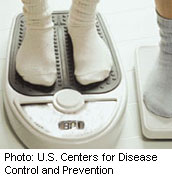
MONDAY, Sept. 9 (HealthDay News) — Obese children and teens who lose weight are in danger of developing eating disorders — including anorexia and bulimia — and a new study highlights how this can happen.
These problems may not be diagnosed quickly, because parents and doctors “think it’s a good thing that these teens have lost so much weight,” said lead researcher Leslie Sim, an assistant professor of psychology and an eating disorders expert at the Mayo Clinic Children’s Center in Rochester, Minn.
“We started to see kids coming into our clinic with severe eating disorders such as anorexia nervosa, where you lose a lot of weight and restrict your eating, and these kids actually started out as obese,” she said.
“They lost way too much weight and became preoccupied with their eating,” Sim said. “Every thought and behavior really surrounded eating.”
The new report, published online Sept. 9 and in the October print issue of the journal Pediatrics, focuses on two cases of obese teens who’d lost a great deal of weight.
In the first case, a 14-year-old boy lost 87 pounds over two years. Although the plan had been to get him to eat healthy and exercise, he developed a severe eating disorder involving a drastically low calorie intake and rigid food restrictions.
Despite losing more than half his body weight, among other symptoms, doctors initially ruled out eating disorders as a diagnosis, according to the study. Finally, his mother insisted on an eating disorders evaluation.
In the second case, an 18-year-old girl lost 83 pounds over three years. After seeing a doctor, the girl’s mother said she was concerned because her daughter wasn’t eating any fat and had restricted eating in general.
Although these were clear signs of an eating disorder, the doctor attributed the girl’s dizziness and not having menstrual periods as symptoms of dehydration or possible polycystic ovary syndrome — a hormone imbalance that causes menstrual cycle changes.
Both teens had embarked on running regimens as part of their weight-loss efforts.
In both cases, despite regular check-ups and clear signs of undernourishment, their eating disorders were not recognized and only got worse, Sim said.
Kids she’s seen with these problems were constantly worried about what and how much they were eating, Sim said, and were socially withdrawn and depressed.
“We think obese kids are at risk for eating disorders because they are getting a lot of media messages that they are not healthy and that there is something wrong with them and they need to change their ways,” Sim said. “And because they are teens, they do extreme things.”
Weight loss is not that typical for adolescents, Sim said. “I think parents should be concerned with any weight loss,” she said.
When parents see their children losing weight, they should ask about their eating habits and whether they are skipping meals or avoiding friends, as these may be signs of an eating disorder, Sim said.
Dr. Metee Comkornruecha, an adolescent medicine specialist at Miami Children’s Hospital, said this is something doctors see a lot.
Genetics plays a role, but other psychological problems such as anxiety and depression also have a part, said Comkornruecha, who was not involved in the study.
“Whenever you see a kid losing weight, you have to see exactly how they are doing it,” he said. “Weight loss at any cost is not a good thing. They have to be doing it in a healthy manner, which means eating the right foods and exercising.”
At least 6 percent of teens suffer from eating disorders, while many more engage in unhealthy eating behaviors such as fasting, taking diet pills or laxatives, vomiting, and bingeing, according to background information included in the study.
The study highlighted many important messages, said Dr. David Katz, director of Yale University’s Prevention Research Center.
“First, obesity itself is a risk factor for eating disorders,” Katz said. “This link is well established for binge-eating disorder, where obesity is potentially both cause and effect.”
Eating disorders are about low self-esteem and self-efficacy, and the effort to exert control over food intake is a manifestation of other underlying issues. All of these matters are apt to be compounded by obesity, he said.
“Second, while weight loss in the context of obesity may appear beneficial, there is a point at which the methods used — or the extremes reached — may indicate an eating disorder,” Katz said.
“Effective treatment of obesity cannot simply be about weight loss — it must be about the pursuit of health,” Katz said. “An emphasis on healthful behaviors is a tonic against both obesity and eating disorders. By placing an emphasis on diet and activity patterns for health and by focusing on strategies that are family based, we can address risk factors for both eating disorders and obesity.”
More information
To learn more about obesity in children and teens, visit the American Academy of Child and Adolescent Psychiatry.
Copyright © 2026 HealthDay. All rights reserved.

